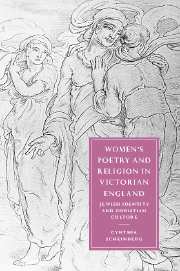Book contents
- Frontmatter
- Contents
- Acknowledgments
- 1 Introduction
- 2 “Sweet singers of Israel”: gendered and Jewish otherness in Victorian poetics
- 3 Elizabeth Barrett Browning and the “Hebraic monster”
- 4 Christina Rossetti and the Hebraic goblins of the Jewish Scriptures
- 5 “Judaism rightly reverenced”: Grace Aguilar's theological poetics
- 6 Amy Levy and the accents of minor(ity) poetry
- Notes
- Bibliography
- Index
- CAMBRIDGE STUDIES IN NINETEENTH-CENTURY LITERATURE AND CULTURE
4 - Christina Rossetti and the Hebraic goblins of the Jewish Scriptures
Published online by Cambridge University Press: 22 September 2009
- Frontmatter
- Contents
- Acknowledgments
- 1 Introduction
- 2 “Sweet singers of Israel”: gendered and Jewish otherness in Victorian poetics
- 3 Elizabeth Barrett Browning and the “Hebraic monster”
- 4 Christina Rossetti and the Hebraic goblins of the Jewish Scriptures
- 5 “Judaism rightly reverenced”: Grace Aguilar's theological poetics
- 6 Amy Levy and the accents of minor(ity) poetry
- Notes
- Bibliography
- Index
- CAMBRIDGE STUDIES IN NINETEENTH-CENTURY LITERATURE AND CULTURE
Summary
“A LINE DRAWN SOMEWHERE”: ROSSETTI AND THE CONSTRUCTION OF DIFFERENCE
Does it not appear as if the Bible was based upon an understood unalterable distinction between men and women, their position, duties, privileges? Not arrogating to myself but most earnestly desiring to attain to the character of humble orthodox Xtian, so does it appear to me; not merely under the Old but also under the New Dispensation. The fact of the Priesthood being exclusively man's, leaves me in no doubt that the highest functions are not in this world open to both sexes: and if not all, then a selection must be made and a line drawn somewhere.
(Letter, cited in Bell, Christina Rossetti, 111–12)When as samples of Old Testament servants of God we select some (since we cannot discuss all), who evidently and eminently have prefigured Christ, at the least in some point of their career, we shall many times find them characterized by that very uncompletedness (if I may term it so: for I mean a very different thing from the defect named incompleteness) which we have been considering.
(Christina Rossetti, Seek and Find, 147)Christina Rossetti (1830–94) is perhaps the most famous and anthologized of all women poets of her day. Cast as the master craftswoman of tightly wrought, highly symbolic poems, the deeply devout spinster, Rossetti carries one of the most powerful reputations of all Victorian women poets, and likewise embodies some of the most stereotypical myths of the Victorian woman artist.
- Type
- Chapter
- Information
- Women's Poetry and Religion in Victorian EnglandJewish Identity and Christian Culture, pp. 106 - 145Publisher: Cambridge University PressPrint publication year: 2002



